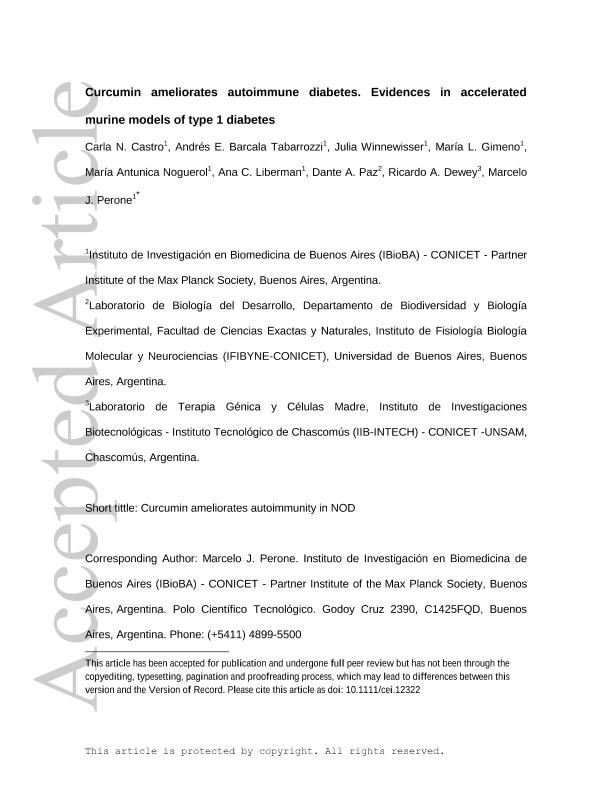Artículo
Curcumin ameliorates autoimmune diabetes. Evidences in accelerated murine models of type 1 diabetes
Castro, Carla Noemí ; Barcala Tabarrozzi, Andrés Ezequiel
; Barcala Tabarrozzi, Andrés Ezequiel ; Winnewisser, Julia; Gimeno, Maria Laura
; Winnewisser, Julia; Gimeno, Maria Laura ; Antunica Noguerol, María de Las Nieves
; Antunica Noguerol, María de Las Nieves ; Liberman, Ana Clara
; Liberman, Ana Clara ; Paz, Dante Agustin
; Paz, Dante Agustin ; Dewey, Ricardo
; Dewey, Ricardo ; Perone, Marcelo Javier
; Perone, Marcelo Javier
 ; Barcala Tabarrozzi, Andrés Ezequiel
; Barcala Tabarrozzi, Andrés Ezequiel ; Winnewisser, Julia; Gimeno, Maria Laura
; Winnewisser, Julia; Gimeno, Maria Laura ; Antunica Noguerol, María de Las Nieves
; Antunica Noguerol, María de Las Nieves ; Liberman, Ana Clara
; Liberman, Ana Clara ; Paz, Dante Agustin
; Paz, Dante Agustin ; Dewey, Ricardo
; Dewey, Ricardo ; Perone, Marcelo Javier
; Perone, Marcelo Javier
Fecha de publicación:
07/2014
Editorial:
Wiley
Revista:
Clinical And Experimental Immunology
ISSN:
0009-9104
Idioma:
Inglés
Tipo de recurso:
Artículo publicado
Clasificación temática:
Resumen
Type 1 diabetes (T1DM) is a T cell-mediated autoimmune disease that selectively destroys pancreatic β cells. The only possible cure for T1DM is to control autoimmunity against β cell-specific antigens. We explored whether the natural compound curcumin, with anti-oxidant and anti-inflammatory activities, might down-regulate the T cell response that destroys pancreatic β cells to improve disease outcome in autoimmune diabetes. We employed two accelerated autoimmune diabetes models: (i) cyclophosphamide (CYP) administration to non-obese diabetic (NOD) mice and (ii) adoptive transfer of diabetogenic splenocytes into NODscid mice. Curcumin treatment led to significant delay of disease onset, and in some instances prevented autoimmune diabetes by inhibiting pancreatic leucocyte infiltration and preserving insulin-expressing cells. To investigate the mechanisms of protection we studied the effect of curcumin on key immune cell populations involved in the pathogenesis of the disease. Curcumin modulates the T lymphocyte response impairing proliferation and interferon (IFN)-γ production through modulation of T-box expressed in T cells (T-bet), a key transcription factor for proinflammatory T helper type 1 (Th1) lymphocyte differentiation, both at the transcriptional and translational levels. Also, curcumin reduces nuclear factor (NF)-κB activation in T cell receptor (TCR)-stimulated NOD lymphocytes. In addition, curcumin impairs the T cell stimulatory function of dendritic cells with reduced secretion of proinflammatory cytokines and nitric oxide (NO) and low surface expression of co-stimulatory molecules, leading to an overall diminished antigen-presenting cell activity. These in-vitro effects correlated with ex-vivo analysis of cells obtained from curcumin-treated mice during the course of autoimmune diabetes. These findings reveal an effective therapeutic effect of curcumin in autoimmune diabetes by its actions on key immune cells responsible for β cell death.
Palabras clave:
Dendritic Cells
,
Inflammation
,
Nod Mouse
,
T-Bet
,
T Lymphocytes
Archivos asociados
Licencia
Identificadores
Colecciones
Articulos(CCT - LA PLATA)
Articulos de CTRO.CIENTIFICO TECNOL.CONICET - LA PLATA
Articulos de CTRO.CIENTIFICO TECNOL.CONICET - LA PLATA
Articulos(IBIOBA - MPSP)
Articulos de INST. D/INV.EN BIOMED.DE BS AS-CONICET-INST. PARTNER SOCIEDAD MAX PLANCK
Articulos de INST. D/INV.EN BIOMED.DE BS AS-CONICET-INST. PARTNER SOCIEDAD MAX PLANCK
Citación
Castro, Carla Noemí; Barcala Tabarrozzi, Andrés Ezequiel; Winnewisser, Julia; Gimeno, Maria Laura; Antunica Noguerol, María de Las Nieves; et al.; Curcumin ameliorates autoimmune diabetes. Evidences in accelerated murine models of type 1 diabetes; Wiley; Clinical And Experimental Immunology; 177; 1; 7-2014; 149-160
Compartir



